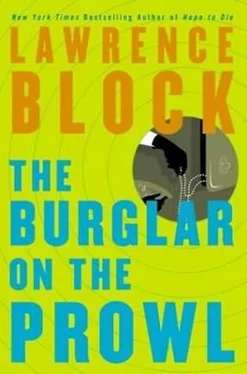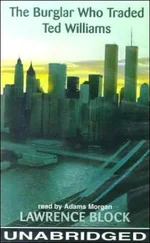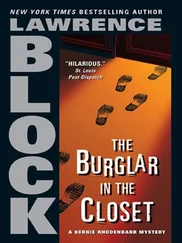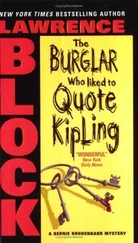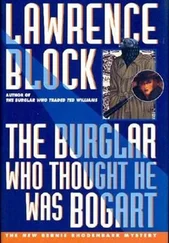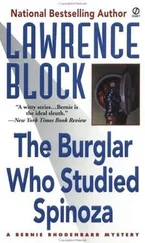I went to the parcel room, tried the door. It was locked. I put an ear to it and listened, and couldn't hear a thing but my own heartbeat.
I got out my tools and went to work.
Whoever they were, I guess they must have stocked up on duct tape when some genius in Washington suggested you could seal your windows with it in the event of a terrorist attack. They'd evidently got to Kmart before the supply ran out, so they had plenty, and they weren't stingy with it when it came time to immobilize Edgardo, who was unfortunate enough to be on duty when they came calling.
They'd taped his wrists behind his back, and then they'd sat him down in a straight-backed wooden chair and taped each of his ankles to the chair's front legs. Then they'd wound tape around his middle, fastening him to the back of the chair, and somewhere along the way they'd slapped a piece of tape over his mouth. But they'd left his nose uncovered, thank heavens, and he was still alive.
But that was about as much as you could say for him. He'd made a valiant effort to free himself, rocking to and fro on the chair until he managed to tip it over, but all that did was make his position that much more uncomfortable. He'd wound up more or less on his side, with his feet in the air and his head tilted downward. That way the blood could rush to his head, but it didn't have to rush, it could take its time, because Edgardo wasn't going anywhere.
He was so positioned that he could see a patch of floor and not much else, and when I opened the door he had no way of knowing who it was-someone come to rescue him, or the same guys coming back to finish the job. But it was somebody, so he made as much noise as he could, issuing a string of nasal grunts that were eloquent enough in their own way. If nothing else they let me know he was alive, and I matched his eloquence with a sigh of relief and rolled him over so we could get a look at each other, and so that I could set about getting him loose.
I picked at a corner of the tape covering his mouth, got enough of it free to get a grip on it, and told him to brace himself. "This is going to hurt," I said, and I was right about that. I gave a yank and got the tape off, and I swear the poor bastard's eyes popped halfway out of his head, but he didn't make a sound.
I don't know how he held it in. He's short and slim, with a boyish face, and I suppose he grew the mustache to make himself look older. It was a sparse and tentative mustache, and thus had the opposite effect, making him look like somebody who was trying to look older. And now it was all at once considerably sparser and more tentative, because a substantial percentage of it had come off along with the duct tape, and how he kept from screaming in agony is beyond me.
What he did do, when he had the chance, was rattle off a long frenzied speech as fast as he could talk. It was in Spanish, so I didn't understand a word of it, but I could tell it was heartfelt.
"Easy," I said. "You're okay. They're not coming back. You'll be all right now, Edgardo."
"Edgar."
"I thought your name was Edgardo."
He shook his head. "No more. Now is Edgar. Is more American."
"Fair enough. Hold still and I'll cut you loose."
There was far too much tape to try ripping it off, and I'd thought I would have to run upstairs for my Swiss Army knife, but I remembered that we were in the parcel room, and of course there was a box-cutter on the desk. It gave me a turn to see it there, as box-cutters don't seem nearly as innocent as they did a few years ago, but it was just what the job demanded, and I managed to cut the tape without cutting Edgardo-I'm sorry, make that Edgar-and before too long I had the chair standing up and him sitting in it.
"Now," I said, "just sit tight, okay?"
"Tight? How I sit tight?"
"It's an expression," I said. " Un idioma. Never mind. Just stay here, and I'll get you a glass of water. You want a glass of water?"
"Hokay."
"I'll be right back with it. I'll get the water and I'll call the cops, and-"
"No!"
"No? Look, Edgar, you could have been killed, and the guys who did this to you already killed three other people, and one of them was a doorman just like you. Of course I'm going to call the police."
He looked on the point of tears.
"Why not?"
"You want me to call the INS?"
"Ay,Cristo! No!"
"Oh," I said. "You don't want me to call the INS. And you don't want me to call the police because you're afraid they'll call the INS." He was nodding enthusiastically, clearly pleased that he'd finally made himself understood by this gringo idiot. "But you're not illegal, are you? How could you get hired here without a Green Card?"
It took a few minutes, but he got the point across. There were, it turned out, Green Cards and Green Cards. Some of them were issued by the Immigration and Naturalization Service, while others were the product of private enterprise. The latter would serve to placate a prospective employer, but someone from the INS would be able to tell the difference, and one more hardworking and productive New Yorker would be out on his culo.
I started to tell him the police had better things to do than run interference for the INS, and that all they'd want from him was whatever he could tell them about the men who'd wrapped him up like a Christmas present. But halfway through I changed direction, because I wasn't convinced of the truth of what I was saying.
To paraphrase the song fromMy Fair Lady, when a cop's not near the suspect he suspects, he suspects the suspect he's near. A lyric like that's not ever going to make the charts, but it's sadly true all the same. Edgar was clearly the victim in this case, but when they couldn't get anywhere else with what they had, some bright-eyed cop would decide they ought to take a harder look at the doorman, on the chance that he might have been in on it all the time.
And, when his Green Card turned out to be a little gray around the edges, making them even more suspicious of its holder, they'd have no choice but to inform the Immigration and Naturalization bozos, who'd pick up Edgar the minute the cops came to their senses and cleared him. And away he'd go, back to Nicaragua or Colombia or the Dominican Republic, wherever he'd lived back in the good old days when his name was still Edgardo and he earned three dollars a month cutting sugarcane.
"No cops," I agreed, a little belatedly. "And no INS. Come on upstairs and we'll get you cleaned up and get a couple of glasses of water into you. And maybe some coffee. Una copa de café, eh?"
"A cup of coffee," he said, helpfully. "Sí, como no?"
There were two of them, although he only got a look at one, and not a very good look at that. The way they worked it was simple enough. He'd come on duty at ten, and maybe twenty minutes later the first man, taller and heavier than Edgar-a description that fit the greater portion of the adult male population-came up to him, asking for me. He was wearing dark trousers and a zip-front jacket in tan suede, and he had a blue Mets cap pulled down over his forehead. And a shirt, but Edgar didn't get enough of a look at the shirt to remember it.
He rang my apartment, and when I didn't answer he reported the fact to my caller, who hefted the briefcase he'd been carrying. He wanted to leave this for Mr. Rhodenbarr, he told Edgar, but it was important, and he wanted to make sure it was safe. Was there a room for parcels? Something with a lock on the door?
There was, Edgar assured him, and he'd put it there. The man said he wanted him to put it there now, just to be on the safe side, and that he'd make it worth Edgar's while. He'd accompanied this last phrase by rubbing his thumb across the tips of his index and middle fingers, a gesture that, north or south of the border, meant some money would sweeten the deal.
Читать дальше
